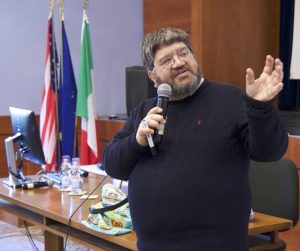Carlo Boccadoro Presents “The Spider's Web: Bach's Influence on Contemporary Music”
On March 13, 2017 the Department of History and Humanities was pleased to host the internationally renowned music composer and conductor Carlo Boccadoro for the lecture “The Spider’s Web: Bach’s Influence on Contemporary Music.”
Hailing from Milan, Boccadoro was recently appointed artistic director of the concert series organized by the prestigious Scuola Normale of Pisa. The author of many books published by Einaudi, he is a regular Radio 3 host, and his compositions are performed all over the world including such venues as the Teatro alla Scala in Milan, the Salle Pleyel in Paris, the Musikverein in Vienna, and the London Barbican Centre. Several of his compositions have been produced by EMI Classics, Sony Classical, Ricordi, and Warner Classics.

Music composer Carlo Boccadoro giving his lecture “The Spider’s Web: Bach’s Influence on Contemporary Music” at John Cabot University
“Johann Sebastian Bach is a paradox,” Boccadoro began. Bach is considered by many to be the paramount universal composer. Everyone can enjoy Bach and be moved by his work, even people who have not been exposed to Western classical music. And yet Bach never left his country, having spent his entire life in Germany. His composing was merely providing music for the local community, and he never considered his work to be art. His music had a practical use, and Bach himself probably would never have imagined that it would still be played all over the world for mere entertainment, 300 years after his death.
The paradox continues: Bach’s influence reaches far beyond the genre of classical music. Boccadoro played records from several jazz composers like Miles Davis for example, and he explained that despite not sounding anything like Bach, Davis, like the German composer, effectively used economy and space: “Even by playing the same cord, the same note, with one single instrument Davis could make amazing things, leaving a lot of space behind each instrumental phrase, so as to have time to breathe.”
Bach inspired Paul McCartney too: the night before the Beatles recorded the famous”Penny Lane,” McCartney heard Bach’s 2nd Brandenburg Concerto and he decided to add a piccolo trumpet piece to the song.
Boccadoro also discussed some of the technical aspects of Bach’s compositions. For example, the cantatas that he wrote every Sunday are characterized by a double speed, rooted in a more ancient technique of medieval music: one part of the music is fast moving, and the other almost twice as slow, and it’s up to the listeners to decide which one they want to follow. The fast part keeps accumulating speed, the slow part becomes slower and slower and shorter and shorter until it goes back to where it started; the core changes four times in the course of a 20 minute piece. Another characteristic of Bach is that melody equals harmony, something that very few composers tend to do.
Since Bach’s language is so flexible that it can easily be reshaped, and its structure can be re-adapted, many musicians of the past and present decide to go “back to Bach.” Other composers who looked at Bach’s music for inspiration are the Italian Luciano Berio in his sequenza for violin, as well as the Americans John Adams and David Lang. The latter, who also wrote the Oscar nominated scores for Paolo Sorrentino’s The Great Beauty and Youth, drew influence from Bach’s St. Matthew Passion when writing The Little Match Girl Passion. The music is mathematically composed and infused with many emotions despite having very few elements.
After the lecture, Prof. Brunella Antomarini opened the floor for questions. A student asked Boccadoro to describe Bach’s heritage. The composer replied that Bach was not famous during his lifetime because he did not write for opera. There was no such thing as copyright at the time and composers were really just considered a craftsman. While the names of singers were well-known, the concept of the composer as artist did not yet exist. Bach risked being just a footnote in the history of music since he was considered a “boring organist” and wasn’t viewed as an innovator. The only people who knew and enjoyed his music were other composers like Mozart and Beethoven. It took three centuries after his death for Bach to be discovered and fully appreciated.





